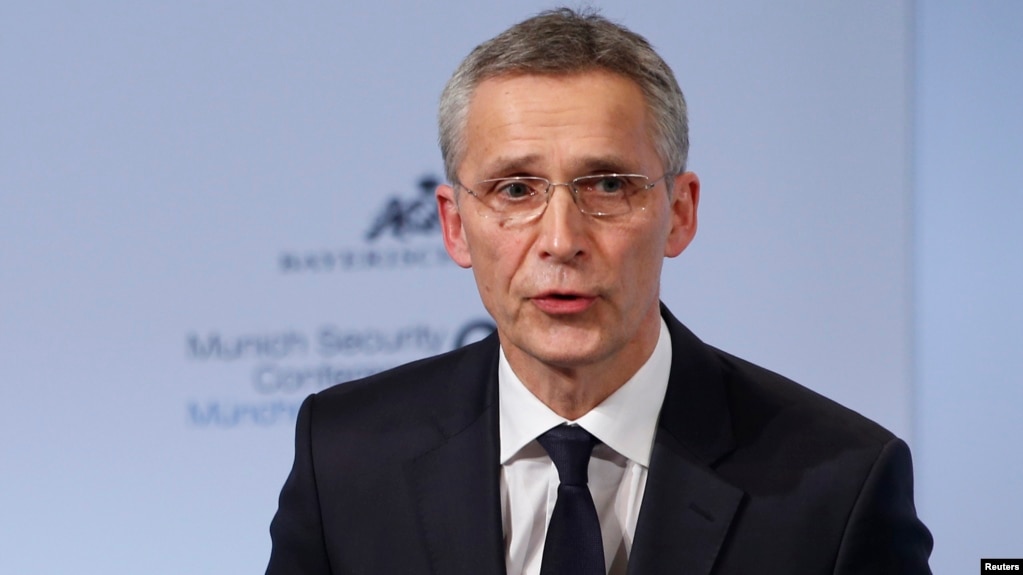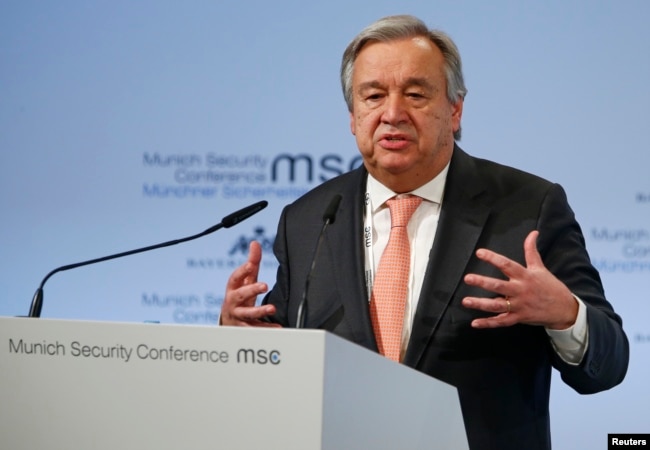NATO Chief Warns of Growing Nuclear Threat From North Korea, Russia

MUNICH — The head of NATO has said the alliance is determined to avoid a new arms race with Russia, but he warned that Moscow is developing new nuclear weapons that pose a threat to the West.
“Russia is modernizing its nuclear capabilities, developing new nuclear systems, and increasing the role of nuclear weapons in its military strategy. This is a cause for real concern,” NATO Secretary General Jens Stoltenberg told delegates Friday at the three-day Munich Security Conference.
Political and military leaders from across the world are gathered in the southern German city to discuss defense issues, amid growing doubts over the future of the current global order.
Stoltenberg said NATO is determined to avoid a new Cold War. He welcomed the European Union’s embryonic plans to cooperate more closely on defense, under an agreement signed in December known as PESCO, or Permanent Structured Cooperation.
“They are an opportunity to further strengthen the European pillar within NATO and contribute better burden sharing. But with opportunity comes risk. The risk of weakening the trans-Atlantic bond, the risk of duplicating what NATO is already doing,” Stoltenberg said Friday.
Trans-Atlantic and European
The United States has echoed those concerns in recent weeks. However, Germany’s Defense Minister Ursula Von Der Leyen told the conference that such fears were misplaced.
“We want to stay trans-Atlantic in our outlook, but also become more European. A start has been made. Last December we finally launched plans for a European Defense Union. In a way we started out on the political path toward working on a European army.”
Washington repeatedly has called for European allies to boost defense spending.
U.S. Defense Secretary Jim Mattis was present Friday in Munich, but will not address the conference.
Mixed American signals
Analyst and Professor James Davis of the University of Saint Gallen in Switzerland, who is participating in the conference, says the U.S. is sending mixed signals to its allies.
“We’ve got Americans ramping up their presence along the eastern flank of NATO. And so, at the level of commitment, real commitment of American capabilities, there seems to be actually a re-engagement. But at the political level, at the level of political leadership, strategic leadership, I think people sense the lack of voice,” Davis told VOA.
Meanwhile, the United Nations Secretary General Antonio Guterres said the brinkmanship over North Korea’s nuclear program can be defused.
“I would say the two key stakeholders in relation to this crisis, the United States and North Korea, are able to come together and to have a meaningful discussion on these issues. I believe the United States is ready to do so, and recent statements by the Vice President [Mike Pence] demonstrate that it’s absolutely essential to keep the pressure over North Korea and to convince North Korea that it is absolutely vital for them to come to the table and to be able to find a way for this denuclearization, the peaceful denuclearization, of the Korean Peninsula to be possible.”
U.S. National Security Adviser H. R. McMaster is also to speak at the conference Saturday, and he is expected to address concerns over North Korea’s nuclear program and the United States’ commitment to NATO.
Source: https://www.voanews.com/a/nato-chief-warns-nuclear-threat-north-korea-russia-/4258770.html
